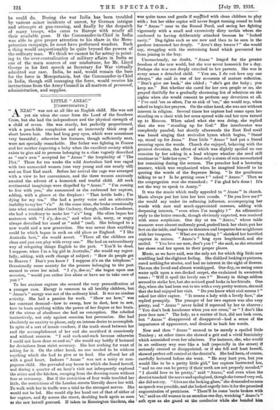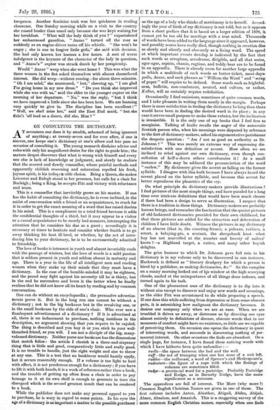LITTLE " ANZAC."
tCOM1WN1CATED.]
" A NZAC " was not at all like an English child. She was not 13.. yet six when she came from the Land of the Southern Cross, but she had the independence and the physical strength of a child of seven. She was sturdy, but perfectly proportioned, with a peach-like complexion and an immensely thick crop of short brown hair. She had long grey eyes, which were sometimes very beautiful ; otherwise her features, though sufficiently neat, were not specially remarkable. Her father was fighting in France and her mother expecting a baby when the excellent society which exists to give aid to persons belonging to a class vaguely described as " one's own " accepted for " Anzac " the hospitality of " The Flat." There for ten weeks the 'wild Australian bird was caged with two unmarried women (one very young and one nearly old) and an East End maid. Before her arrival the cage was arranged with a view to her convenience, and the three women anxiously awaited the advent of a homesick and tearful child. All such sentimental imaginings were dispelled by "Anzac." "I'm coming to live with you," she announced as she embraced her captors, adding, with a glance at the fireplace : " That kettle boils ; I'm dying for my tea." She had a pretty voice and an attractive inability to say her " es." At the same time, she broke occasionally into what sounded almost like Cockney, though, unlike a Londoner, she had a tendency to make her " a's " long She often began her sentences with " I s'y, dee-ar," and when sick, sorry, or angry always described her mood as " sand " (sad). She belonged to a new world and a new generation. She was newer than anything could be which began in such an old place as England. " I like Australia best," she would assert. " There all the children are clean and you can play with every one." She had an extraordinary way of relegating things English to the past. " You'll be dead, I suppose, when I'm a big girl in Australia," she would say regret- fully, adding, with swift change of subject : " How do people get to Heaven ? Don't you know ? I suppose it's on the telephone." Occasionally some anxiety for the persons belonging to the past seemed to cross her mind. " I s'y, dee-ar," she began upon one occasion, " would you rather live alone or have me to take care of you 2 " To her anxious captors she seemed the very personification of a younger race. Energy is common to all healthy children, but " Anzac's " energy was not of the ordinary kind. It was no aimless activity. She had a passion for work. " Show me how," was her constant demand—how to sweep, how to dust, how to sew, how to learn anything within the power of her fmgers or her brain. Of the virtue of obedience she had no conception. She rebelled Instinctively, not only against coercion but persuasion. She had absolutely no anxiety to please, only an intense desire to accomplish. In spite of a sort of innate candour, if the truth stood between her and the accomplishment of her end she sacrificed it consciously and without remorse. " I said such-and-such because otherwise I could not have done so-and-so," she would say boldly if lectured for deviations from strict accuracy. She lost nothing for want of asking for it. On the other hand, no one needed to be without 'anything which she had to give or to lend. She offered her all with a good heart. Indoors " Anzac " was not a noisy or ram- pageous child. She pervaded any house in which she found herself, and during a quarter of an hour's visit not infrequently explored the attics and the kitchen, escaping from the drawing-room without fuss or ceremony. But if the restriction of four walls troubled her little, the restrictions of the London streets literally drove her wild. Fo walk with her in traffic was a trial to the strongest nerves. She would not be led. She would slip her hand out of that of either of her captors, and fly across the street, doubling back again as soon as she saw herself pursued. If taken to Kensington Gardens, she was quite tame and gentle if supplied with clean children to play with ; but her elder captor will never forget turning round to leek for " Anzac " near to the Round Pond, and seeing her fighting vigorously with a small and excessively dirty urchin whom she confessed to havieg deliberately attacked because he " looked nasty." Dog-fights such as are now and then to be seen in the gardens interested her deeply. "Aren't they bwave ? " she would say, struggling with the restraining hand which prevented her from joining in the fray.
Unconsciously, no doubt, " Anzac " longed for the greater freedom of the new world, but she was never homesick for a day. Perhaps she was not deeply attached to her parents. She was in every sense a detached child. " You see, I do not love any one always," she said in one of her moments of mature reflection. " Don't give me back," she added ; " she's got the baby ; you keep me." But whether she cared for her own people or no, she prayed dutifully for a gradually shortening list of relations on the nights when she would consent to perform any devotions at all. " I've said 'em so often, I'm so sick of 'em," she would say, when asked to begin her prayers. On the other hand, she was not without interest in religion. Several times her captors had come upon her standing on a chair with her arms spread wide and her eyes turned up to Heaven. When asked what she was doing, she replied that she was " standing up for God." Her interlocutor was completely puzzled, but shortly afterwards the East End maid was heard singing that revivalist hymn which begins, " Stand up, stand up for Jesus." Poor little " Anzac " had put a literal meaning upon the words. Church she enjoyed, behaving with the greatest devotion, the effect of which was slightly spoiled on one occasion by her asking in a loud whisper whether she need still continue to " hide her eyes." Once only a storm of rain necessitated her remaining during the sermon. The preacher had a hectoring manner, which was emphasized when he imagined himself to be quoting the words of the Supreme Being. " Is the gentleman talking to us ? Is he getting cross ? " asked " Anzac." Then as the congregation rose she remarked : " I'm glad he's done I It's not the way to speak to Aunty."
It was the music which really appealed to " Anzac " in church. Music always put her into her best moods. " Do you love me?" she would say under its softening influence, accompanying her words with rare and much-appreciated caresses, adding with deepening interest, " even when I'm naughty ? " An affirmative reply to the latter remark, though obviously expected, was received with some scepticism. One day at tea " Anzac," whose table manners were almost uniformly good, pushed back her chair, put her feet on the table, and began to threaten and bespatter her neighbours with her teaspoon. " What are you doing ? " shrieked her horrified captors in unison. " Anzac's " long eyes lengthened, and she smiled. " You love me now, don't you ? " she said, as she returned her shoes and her spoon to their proper places.
Music, as we have said, was the only art for which thii little new worldling had the slightest feeling. She disliked looking at pictures, cared nothing for stories, and had no interest in the sight of flowers. The sun she loved and almost worshipped. One day, on seeing some water spilt upon a sun-flecked carpet, she exclaimed in awestruck tones : " Will it spoil the lovely sun ? " Beauty in things seldom seemed to strike her, but she noticed good looks in her friends. One day, when she had been out to tea with a very pretty woman, she said that she had enjoyed her visit. " Do you know what visit means ? " asked her elder captor. " It means a lady with a lovely face," she replied promptly. The younger of her two captors was also very pretty, and " Anzac " never failed if reproved by her to observe : " You don't look handsome when you are cross," or " I don't like your face now." The lady, as a matter of fact, did not look cross, but " Anzac " disapproved of disapproval—had a sense of the importance of appearance, and desired to barb her words.
Now and then " Anzac " seemed to be merely a spoiled little Tomboy ; at other times she showed a grit and a vivid femininity which astonished even her admirers. For instance, she, who would in an ordinary way roar like a bull (especially in the street) if seriously crossed or disappointed, or if she fell and hurt herself, showed perfect self-control at the dentist's. She had been, of course, carefully lectured before she went. " He may hurt you, but you would like to be a pretty little girl," her captors instructed her, " and no one can be pretty if their teeth are not properly mended." "I should love to be pretty," said "Anzac," and even when the dentist touched the nerve and apologized, though she turned very red, she did not cry. " Give me the Iooking-glass," she demanded as soon as speech was possible, and she looked eagerly into it for the promised augmentation of prettiness. " There'll be some 'carts broken with 'er," said an old woman in an omnibus one day, watching " Anzac's " soft eyes as she gazed at the conductor while she banded him
twopence. Another feminine trait was her quickness in reading character. One Sunday morning while on a visit to the country she roared louder than usual only because she was kept waiting for her breakfast. " What will the lady think of you ? " expostulated her embarrassed guardian. " Anzac " turned off the roar as suddenly as an engine-driver turns off his whistle. " She won't be angry ; she is one to forgive little girls," she said with decision. She had only known her hostess a few hours. A sort of warm indulgence is the keynote of the character of the lady in question, and " Anzac's " captor was struck dumb by her perspicuity.
Would " Anzac " weep when she went home ? This was what the three women in the flat asked themselves with almost shamefaced interest. She did weep—without roaring—for about three minutes. " Oh I am sand," she murmured, " but," cheering up, " I am glad Pm going home in my new dress." " Do you think she improved while she was with us," said the elder to the younger captor on the morning of her departure. " No," was the reply, " but I think we have improved a little since she has been hero. We are learning very quickly to give in. The discipline has been excellent ! " " Well, we shall miss her," said the East End maid, " but she didn't 'alf lead us a dance, did she, Miss ? "































 Previous page
Previous page